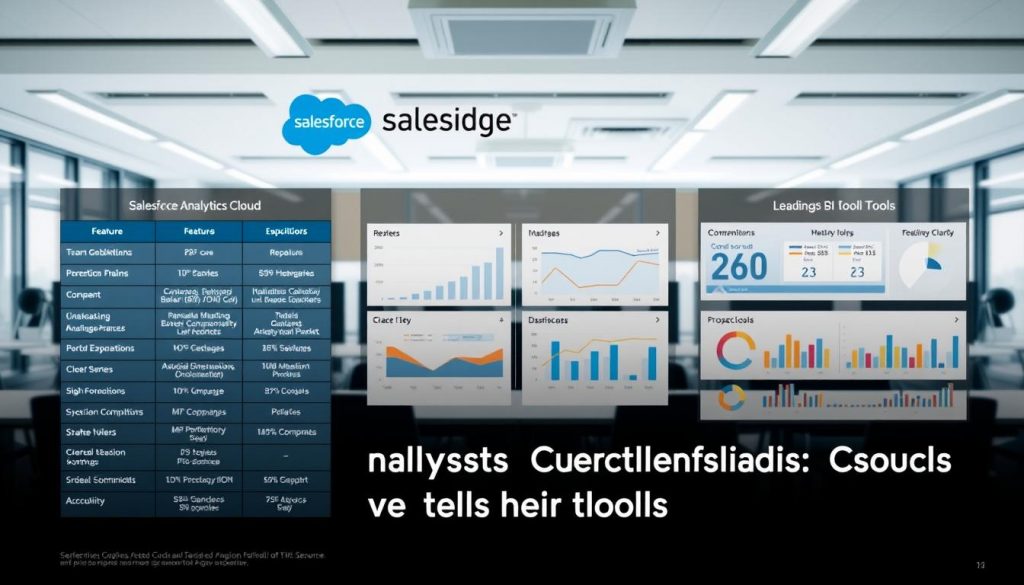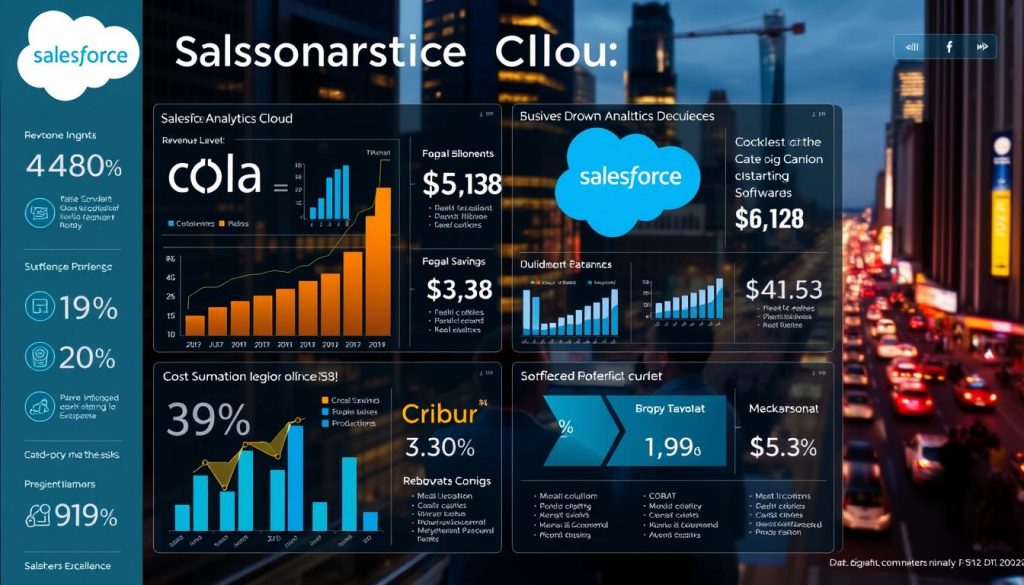In today’s world, businesses need new ways to use their data. Cloud analytics solutions help them make quick, smart decisions. Did you know companies using advanced analytics see more revenue and happier customers?
The Salesforce Analytics Cloud is a top tool for unlocking data’s power. We’ll dive into its features, benefits, and how it stands against other BI tools in 2025. You’ll see how it can change your business and help it grow.
Key Takeaways
- Understanding the core features of Salesforce Analytics Cloud.
- Discovering the benefits of using cloud analytics solutions.
- Learning how Salesforce Analytics Cloud compares to other BI tools.
- Exploring real-world applications and success stories.
- Identifying best practices for implementing Salesforce Analytics Cloud.
The Power of Data-Driven Decision Making in Modern Business
Page era>
In today’s fast-paced business world, making smart decisions is key to success. Companies are turning to data analytics to guide their choices, better serve customers, and stay competitive. Page era.
Data analytics is now a big part of business, helping companies understand customer habits, market trends, and how to run better. This move to data-driven decisions has changed how businesses work, making them quicker to adapt to market changes. Page era Pin.
The Growing Importance of Analytics in er CRM
Analytics is now a key part of Customer Relationship Management (CRM) systems. It helps businesses understand their customers better. By looking at customer data, companies can spot trends, preferences, and issues, leading to better marketing plans. Salesforce Analytics Cloud features, like AI insights, help make these plans actionable.
Adding analytics to CRM systems has also boosted sales forecasting, customer grouping, and personalization. This means businesses can improve customer engagement and grow their revenue. Pin Smooth.
How Pin Analytics Transforms Customer Relationships
Analytics is key in changing how businesses connect with customers. It gives companies a full view of their customers. By looking at how customers interact across different channels, businesses can find ways to improve and make their customer engagement better. The Salesforce BI tool helps create custom dashboards and reports, making data-driven decisions easier.
This deep understanding of customer behavior lets companies customize their marketing, enhance customer service, and build loyalty. As more businesses use data-driven strategies, the role of analytics in CRM will keep growing.
Salesforce Analytics Cloud: A Complete Overview
The Salesforce Analytics Cloud has changed a lot from its start as Tableau CRM. It now has new features and abilities. These help businesses understand their data better and make smart choices.
The Evolution from Tableau CRM to Analytics Cloud
Tableau CRM, now Salesforce Analytics Cloud, has a long history of growth. It started as a tool for advanced analytics in Salesforce. Then, it grew into a full analytics platform with AI and machine learning.
The name change to Salesforce Analytics Cloud was a big step. It shows the platform’s bigger role in Salesforce’s plans.
This change has helped businesses use analytics better. It has led to more growth and better customer relationships. The move also made using Salesforce products together easier and smoother.
Core Architecture and Functionality
Salesforce Analytics Cloud is built on a strong base for advanced analytics and data visualization. It focuses on giving users insights they can act on. It has AI analytics, advanced data views, and is designed for mobile use.
The platform’s design can handle lots of data. This means it’s scalable and reliable. Businesses can rely on the insights it gives. They use these insights to make strategic decisions and grow.
Key Features of Salesforce Analytics Cloud in 2025
In 2025, Salesforce Analytics Cloud is changing how companies analyze data. It’s key for making decisions based on data. This platform now has new features that make it even more useful for businesses.
AI-Powered Insights with Einstein Analytics
Einstein Analytics is a big part of Salesforce Analytics Cloud. It uses AI to understand data, find patterns, and predict trends. This helps businesses make smart choices based on data, not just guesses.
Advanced Data Visualization and Salesforce Dashboards
Salesforce Analytics Cloud has great tools for showing data. Users can make dashboards that are easy to use and interactive. These dashboards help track important metrics, letting businesses adjust their plans as needed.
Mobile-First Analytics Experience
Today, being able to check analytics anywhere is important. Salesforce Analytics Cloud lets users access data from anywhere. This is great for sales teams and executives who need to stay updated while on the move.
Embedded Analytics Capabilities
Salesforce Analytics Cloud also has embedded analytics. This means analytics can be part of daily work, making it easier to use. It helps businesses make quick decisions based on data.
Salesforce Analytics Cloud is set to lead in analytics in 2025. It offers AI insights, advanced data views, mobile access, and embedded analytics. These features make it a must-have for companies looking to use data for success.
Business Benefits of Implementing Salesforce Analytics Cloud
Using Salesforce Analytics Cloud changes how businesses make decisions. It helps them find new insights, improve operations, and grow.
Data-Driven Decision Making at Scale
Salesforce Analytics Cloud lets businesses make big decisions with confidence. It offers a single place for analyzing data. This way, companies can look at lots of data, spot trends, and get useful insights.
360-Degree Customer View and Insights
Salesforce Analytics Cloud gives a full picture of customers. It combines data from different places. This helps businesses really understand what their customers want and how they behave.
Sales Performance Optimization and Forecasting
Salesforce Analytics Cloud boosts sales by giving real-time data. It also helps predict future sales. This way, companies can make smart choices to increase their income.
Marketing ROI and Campaign Effectiveness
Marketers can see how well their campaigns work with Salesforce Analytics Cloud. It gives detailed info. This helps businesses know which marketing plans are best and which need tweaking.
| Business Benefit | Description | Impact |
|---|---|---|
| Data-Driven Decision Making | Unified platform for data analysis | Informed decisions at scale |
| 360-Degree Customer View | Comprehensive customer insights | Personalized customer experiences |
| Sales Performance Optimization | Real-time sales insights and forecasting | Revenue growth and improved sales performance |
| Marketing ROI and Campaign Effectiveness | Detailed campaign analytics | Optimized marketing strategies and improved ROI |
Real-World Use Cases and Success Stories
Salesforce Analytics Cloud is changing the game for businesses. It helps them use their data better. Companies in many fields have used it to grow and work more efficiently.
Sales Cloud Analytics Implementation Examples
Businesses using Salesforce Sales Cloud have seen big wins. A top manufacturing company boosted its sales forecast by 25%. They used advanced analytics and AI insights.
Service Cloud Analytics Applications
Salesforce Service Cloud and Analytics Cloud have improved customer service. A telecom company cut its response time by 30%. They used data insights to do it.
Marketing Cloud Integration Success Stories
With Salesforce Marketing Cloud and Analytics Cloud, marketers can track their campaigns better. A retail company increased its email marketing ROI by 40%.
Cross-Dep Pageartmental Analytics Transformation
Salesforce Analytics Cloud helps the whole company make decisions based on data. It breaks down data barriers. This leads to a unified business strategy.
How Salesforce Analytics Cloud Compares to Other BI Tools
Companies need to compare Salesforce Analytics Cloud with tools like Tableau and Microsoft Power BI. They look for data-driven insights to make decisions. Knowing the strengths and weaknesses of each tool is key.

Salesforce Analytics Cloud vs. Standalone Tableau
Salesforce Analytics Cloud, once known as Tableau CRM, offers a tight analytics experience in Salesforce. Standalone Tableau is great for visualizing data from many sources. But Salesforce Analytics Cloud shines by giving insights right in the CRM.
This means users can make decisions without jumping between apps.
Salesforce Analytics Cloud vs. Microsoft Power BI
Microsoft Power BI is a strong BI tool with many data sources and advanced analytics. But Salesforce Analytics Cloud wins because it’s built into Salesforce. This makes it easier and less expensive for users.
Advantages Over Generic BI Solutions
Salesforce Analytics Cloud stands out by giving analytics in the context of Salesforce apps. This lets users act fast on data insights. It also uses Einstein AI for predictions and advice, something generic BI tools can’t do.
This gives businesses a better understanding of their customers and helps them run better.
Implementation and Adoption Strategy
A well-planned strategy is key for Salesforce Analytics Cloud success. To roll it out smoothly, focus on several important areas.
Planning Your Salesforce BI Tool Deployment
Good planning is the base for a successful Salesforce Analytics Cloud launch. You need to set clear goals, know who’s involved, and plan a realistic timeline. Also, check if your data is ready and decide what to include in the project.
Data Integration and Preparation Best Practices
Data integration is a big part of Salesforce Analytics Cloud. Make sure your data is good, use one source, and use Salesforce’s tools. A solid plan helps give accurate insights and keeps data together.
| Data Integration Task | Description | Best Practice |
|---|---|---|
| Data Quality Check | Ensure data accuracy and consistency | Regularly clean and validate data |
| Data Source Unification | Unify data from various sources | Use Salesforce’s data integration tools |
| Data Security | Protect sensitive data | Implement robust security measures |
User Training and Adoption Techniques
Getting users to use Salesforce Analytics Cloud is critical. Good training is essential. Offer interactive sessions, create guides, and provide ongoing help.
By focusing on these areas, you can make Salesforce Analytics Cloud a success. It will help your business grow and make better decisions.
Maximizing ROI from Your Salesforce Analytics Investment
To get the most from your Salesforce Analytics Cloud, knowing how to maximize ROI is key. This means making smart choices about licensing, understanding costs, and measuring analytics’ impact on your business.
Licensing Options and Cost Considerations
Salesforce Analytics Cloud has various licensing options for different needs. It’s important to understand these to optimize your investment. The main options include:
| Licensing Option | Description | Cost Considerations |
|---|---|---|
| Einstein Analytics Platform | Core platform for building custom analytics applications | Subscription-based, with costs varying by user count and feature set |
| Einstein Analytics for Sales | Pre-built analytics for sales teams, focusing on sales performance and forecasting | Includes sales-specific features, with pricing based on the number of sales users |
| Einstein Analytics for Service | Pre-built analytics for service teams, focusing on customer service and support | Priced based on the number of service users, with costs reflecting the value of service insights |
Measuring Analytics Impact on Business Outcomes
To maximize ROI, it’s vital to measure how Salesforce Analytics Cloud affects your business. Track KPIs like sales growth, customer satisfaction, and operational efficiency. Analyzing these metrics helps refine analytics strategies, leading to better decisions and growth.

Understanding licensing, managing costs, and measuring business impact are key to maximizing ROI from Salesforce Analytics Cloud. This approach drives business success through data-driven insights.
The Future of Salesforce Analytics Cloud: 2025 and Beyond
The future of making decisions with data looks bright, thanks to Salesforce Analytics Cloud. It’s set to lead the way into 2025 and beyond. As companies rely more on data, Salesforce Analytics Cloud is getting better with new features.
Emerging AI and Predictive Capabilities
Salesforce Analytics Cloud is getting smarter with AI and predictive tools. Einstein Analytics, a key part, is getting better at giving accurate forecasts and insights. For example, AI can predict what customers might do next, helping companies act fast and seize new chances.
| AI Capability | Description | Business Benefit |
|---|---|---|
| Predictive Modeling | Analyzes customer behavior to forecast future actions | Proactive customer service and targeted marketing |
| Anomaly Detection | Identifies unusual patterns in data | Early detection of possible issues or fraud |
Industry-Specific CRM Analytics Solutions
Salesforce is working on CRM analytics for different industries. This means analytics that fits each industry’s needs, giving companies better insights. For instance, in healthcare, analytics can help improve patient care and outcomes.
“The future of analytics lies in its ability to be tailored to specific industries, providing insights that are both relevant and actionable.” –
As Salesforce keeps innovating, businesses will get even more tools for analyzing data and making decisions. With a focus on AI and specific industry solutions, Salesforce Analytics Cloud is set to stay a leader in analytics.
Conclusion: Making the Right Analytics Decision for Your Organization
Choosing the right analytics solution is key for businesses today. Salesforce Analytics Cloud stands out with its AI insights, advanced visuals, and mobile-first design. It helps companies see their customers fully, improve sales, and track marketing results.
To get the most from Salesforce Analytics Cloud, it’s important to implement it well. Knowing its features and benefits can unlock its power for growth. Keeping up with new AI and predictive tech is also vital for smart choices.
The right analytics choice can change how businesses connect with customers and achieve success. By following the advice in this article, companies can make smart choices in cloud analytics. This will help them reach their goals with Salesforce Analytics Cloud.
